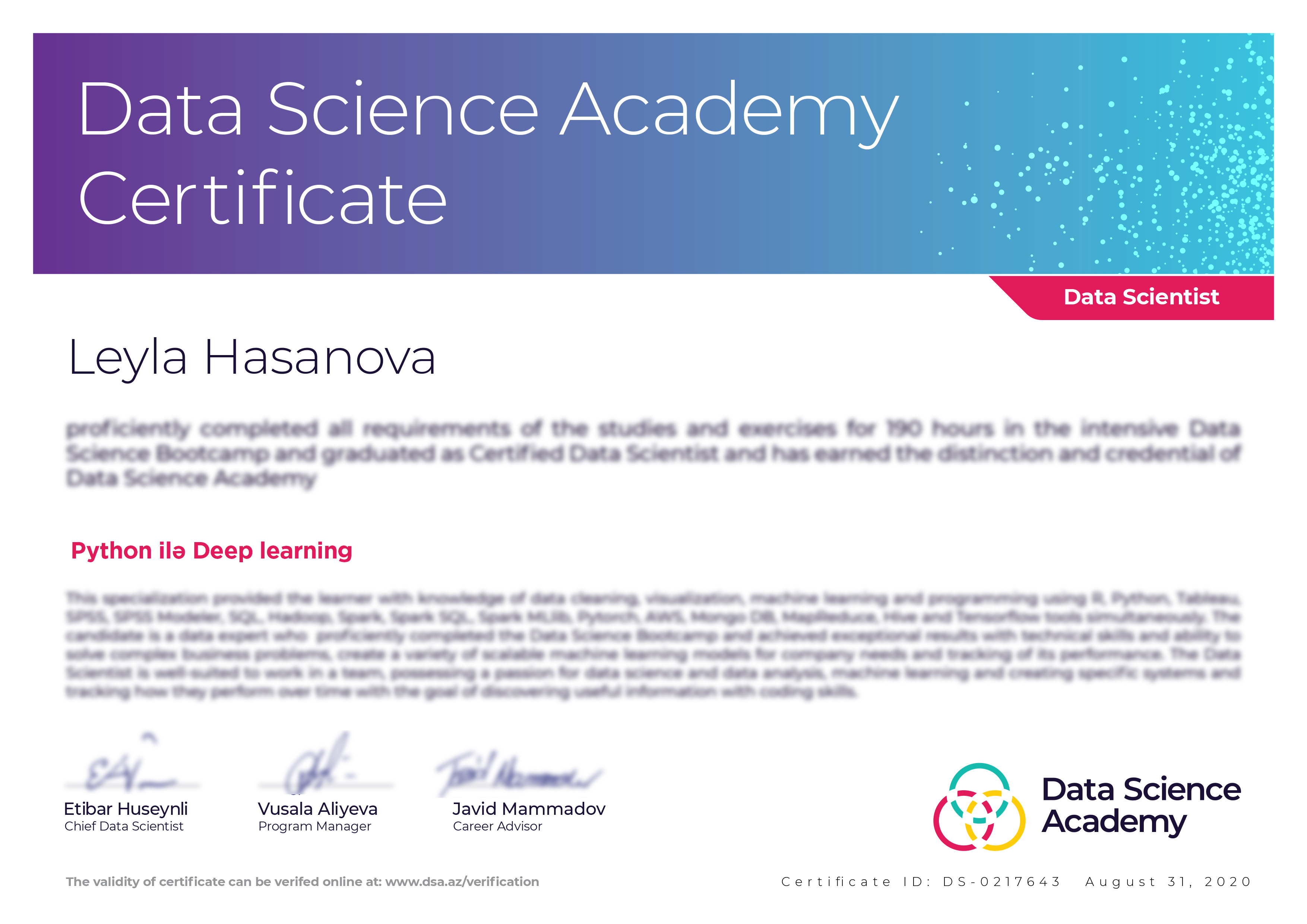
Deep Learning with Python
In the Python Deep Learning course, you will learn deep learning skills by preparing your data for analysis, creating and using machine learning, deep learning, and artificial intelligence algorithms for prediction and image recognition, and integrating them with databases. Python is one of the most popular languages for automating data analysis with artificial intelligence and programming skills. During the course, you will apply methodologies critical for decision-making in marketing, finance, business, healthcare, and government sectors to real-world problems encountered in the workplace.
Training table
Deep Learning with Python
Deep Learning with Python
Deep Learning with Python
Deep Learning with Python
Information about the training
Recent technological advancements (social networks, e-commerce projects, the Internet of Things, etc.) have led to an increase in data. This data growth, in turn, has spurred innovations in artificial intelligence, self-driving vehicles, healthcare advancements, economic forecasting, and more accurate recommendations in the entertainment sector, among other technological revolutions. By joining this training, you will learn to build more precise models using deep learning algorithms such as RNN, CNN, Neural Prophet, and Fastai, utilizing platforms like Keras, PyTorch, and TensorFlow instead of machine learning algorithms on large datasets. You will also be able to perform time series analysis to forecast future data.
Who is this training for?
Individuals with knowledge in Data Science who want to deepen their expertise with modern and complex topics, those interested in learning advanced Deep Learning concepts using Python programming, programmers and data engineers wanting to learn analytics, business managers, business analysts, data analysts, those learning data analytics and interested in the field, individuals working with large datasets, researchers, students and professionals looking to build a career in Data Science, and those preparing or wanting to prepare reports through data analysis in sales, supermarkets, telecommunications, banking, and other business sectors or government agencies.
Certificate
Certificates will be awarded to individuals who successfully complete the training: a Certified Deep Learning with Python certificate for successful participants and a participation certificate for others. You can see a sample certificate on the right.

Deep Learning Tutorial 1 (Tensorflow Tutorial, Keras & Python)
Deep Learning with Python
codebasics
A video for new deep learning tutorial for total beginners. Video Courtesy: codebasics
Syllabus
Session 1
- What is Deep Learning?
- Deep Learning and Its Components: Neurons
- Introduction to Neural Networks
- Introduction to Deep Learning Models
- PyTorch Library and Tensors
- How Neural Networks Work: Forward Propagation
- NN Gradients, Activations, Cost Functions, and Metrics; Backpropagation
Case Study 1
Creating a Neural Network Using PyTorch and Applying It to the "Rain Prediction" Dataset.
Session 2
- Time Series Analysis
- ARIMA and ARMA Models
- Introduction to Prophet and NeuralProphet Libraries.
- Feature Engineering for Time Series.
- Hyperparameter Tuning for Time Series Analysis.
Case Study 2
Building a Model to Forecast the Next 100 Days' Stock Price of Google Using the Facebook Prophet Library
Session 3
- Introduction to Convolutional Neural Networks (CNN)
- CNN Architecture
- Computer Vision: Classic ConvNet
- Architectures: LeNet-5 Classic, AlexNet, VGGNet, ResNet, Inception, Darknet.
- Working with Image Data: Matrices, Dimensions
- Image Augmentation Techniques
Case Study 3
Forecasting CIFAR-10 Dataset Images Using CNN.
Session 4
- FastAI Framework (Tabular, Vision, and Collaborative Filtering).
- FastAI Vision Module - Finding Optimal Learning.
- Hyperparameters Tuning, Model Freezing and Unfreezing.
Case Study 4
Leaf Disease Prediction Using FastAI.
Session 5
- Deployment
- Scikit-Learn API
- Feature Engine
- The Role of Feature Selection in Machine Learning
- Creating Pipeline
Case Study 5
Using the CIFAR-10 dataset to build a CNN model with PyTorch, visualize it, analyze the model's performance, and upload the results to GitHub.
Trainers

Emil Mirzəyev
SÜNİ İNTELLEKT VƏ STRATEJİ QƏRARQƏBULETMƏ RESEARCHER, UNİVERSİTY COLLEGE LONDONDr. Emil Mirzayev holds a dual PhD in Economics and Business Administration and is currently engaged in scientific research at the intersection of Artificial Intelligence and Strategic Decision-Making at University College London, one of the world's top universities. He has nearly 10 years of experience with Python and Data Science, and has presented his work at prestigious institutions like MIT, Harvard, and LBS, as well as at numerous international conferences. In Azerbaijan, he has also conducted multiple free workshops on topics related to Machine Learning and AI.

Əhməd Əhmədov
Senior Data Scientist, Porsche AGAhmad Ahmadov pursued his master’s education in "Data Mining" and "Big Data" at Yonsei University in South Korea. He has more than 10 years of experience in artificial intelligence and data analytics. He has been working at Porsche AG in Germany for 6 years as a Senior Data Scientist and Tech Lead. He is mainly responsible for the development of AI models and project management in fields such as "GenAI," "Digital Assistants," "Customer Mobility Predictions," "Charging Experience Optimization," and "Content Quality Analysis."
His previous professional experiences include:
* Dresden University (Germany): Scientific Researcher in AI and Data Science. Research areas: "Data Imputation," "Data Quality," "Information Retrieval," "Web Tables," "Semi-Structured Datasets," and "Machine Learning." (4 years)
* Bakcell: ERP Technical Analyst. (1 year)
Additionally, he is the author of numerous scientific articles published at various international conferences.